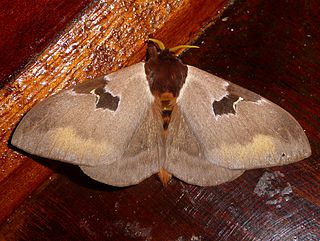
Actias ningpoana, the Chinese moon moth, is a species of moth in the family Saturniidae. The species was first described by father-and-son entomologists Cajetan and Rudolf Felder in 1862. It is quite large, and has long, curved, hindwing tails. There are many congeners across Asia; the Luna moth of eastern Canada and the United States is a close relative.

The Saturniinae or saturniines are a subfamily of the family Saturniidae, also known as giant silkmoths. They are commonly known as emperor moths or wild silk moths. They are easily spotted by the eyespots on the upper surface of their wings. Some exhibit realistic eye-like markings, whilst others have adapted the eyespots to form crescent moon or angular shapes or have lost their wing scales to create transparent windows. They are medium to very large moths, with adult wingspans ranging from 7.5 to 15 cm, in some cases even more. They consist of some of the largest sized Lepidoptera, such as the luna moth, atlas moth, and many more. The Saturniinae is an important source of wild silk and human food in many different cultures.

Perisomena is a genus of moths in the family Saturniidae.
Gilles Terral was a French entomologist. He specialised in Lepidoptera Parnassiinae and Saturniidae.

Cercophaninae is a subfamily of the family Saturniidae, and was, until recently, treated as a separate family, Cercophanidae.
Cercophana is a genus of moths in the family Saturniidae first described by Cajetan Felder in 1862.
Automerella is a genus of moths in the family Saturniidae first described by Charles Duncan Michener in 1949.
Automerina is a genus of moths in the family Saturniidae first described by Charles Duncan Michener in 1949.

Dirphia is a genus of moths in the family Saturniidae first described by Jacob Hübner in 1819.

Dirphiopsis is a genus of moths in the family Saturniidae first described by Eugène Louis Bouvier in 1928.

Hemileuca is a genus of moths in the family Saturniidae first described by Francis Walker in 1855.

Paradirphia is a genus of moths in the family Saturniidae first described by Charles Duncan Michener in 1949.

Periphoba is a genus of moths in the family Saturniidae first described by Jacob Hübner in 1820.

Polythysana is a genus of moths in the family Saturniidae first described by Francis Walker in 1855.
Homoeopteryx is a genus of moths in the family Saturniidae first described by Felder in 1874.

Gonimbrasia is a genus of moths in the family Saturniidae first described by Arthur Gardiner Butler in 1878.
Melanocera is a genus of moths in the family Saturniidae first described by Léon Sonthonnax in 1901.
Ubaena is a genus of moths in the family Saturniidae first described by Ferdinand Karsch in 1900.
Usta alba is a species of moth in the family Saturniidae. It is found in Tanzania.
Usta terpsichore, the cavorting emperor, is a species of moth in the family Saturniidae. It is found in Angola, Burkina Faso, Eritrea, Ethiopia, Malawi, Mozambique, South Africa, Tanzania, Zambia and Zimbabwe.











